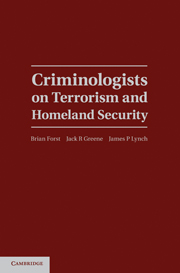Book contents
- Frontmatter
- Contents
- About the Authors
- Preface
- 1 Introduction and Overview
- PART I NATURE OF THE PROBLEM
- PART II STRATEGIES FOR INTERVENTION
- 7 Is Crime Prevention Relevant to Counterterrorism?
- 8 Implications of Opportunity Theory for Combating Terrorism
- 9 Soldiers and Spies, Police and Detectives
- 10 Community Policing and Terrorism
- 11 Go Analyze!
- 12 Managing the Fear of Terrorism
- 13 Should Profiling Be Used to Prevent Terrorism?
- 14 Federal-Local Coordination in Homeland Security
- 15 Liberty and Security in an Era of Terrorism
- 16 Regulating Terrorism
- PART III THINKING ABOUT TOMORROW
- Index
- References
16 - Regulating Terrorism
Published online by Cambridge University Press: 04 February 2011
- Frontmatter
- Contents
- About the Authors
- Preface
- 1 Introduction and Overview
- PART I NATURE OF THE PROBLEM
- PART II STRATEGIES FOR INTERVENTION
- 7 Is Crime Prevention Relevant to Counterterrorism?
- 8 Implications of Opportunity Theory for Combating Terrorism
- 9 Soldiers and Spies, Police and Detectives
- 10 Community Policing and Terrorism
- 11 Go Analyze!
- 12 Managing the Fear of Terrorism
- 13 Should Profiling Be Used to Prevent Terrorism?
- 14 Federal-Local Coordination in Homeland Security
- 15 Liberty and Security in an Era of Terrorism
- 16 Regulating Terrorism
- PART III THINKING ABOUT TOMORROW
- Index
- References
Summary
This essay argues that both the war and criminal justice models are too crude, particularly in their theory of deterrence, for responding to the problem of global terrorism. An alternative regulatory model is advanced that overlays the public health concepts of primary, secondary, and tertiary prevention with other older ideas of containment of injustice and enlargement of justice. An interconnected web of controls might enable an over-determined prevention of terrorism that, in spite of its redundancy, could be more cost-effective than the war model, because the principle of responsiveness means parsimony in resort to expensive coercion. It is possible to have an evidence-based approach to regulating rare events like 9/11 terrorism by applying the principles of evidence-based regulation to micro-elements that are constitutive of macro-disasters. Viewed through this lens, support for pre-emptive wars on terrorism is not evidence-based, but grounded in other public philosophies, notably retribution.
RECONSIDERING DETERRENCE
An early version of this paper was presented at some conferences and published on the Internet in March 2002. The opening paragraph began: “Both the war model for confronting a transnational problem and the criminal justice model share a central commitment to the deterrence doctrine.” There is surely an important role for deterrence in confronting terrorism, especially if we deploy the more sophisticated models of deterrence of international relations (IR) theory, as opposed to those of criminology or law and economics. IR deterrence is more dynamic than the models that now dominate criminology.
- Type
- Chapter
- Information
- Criminologists on Terrorism and Homeland Security , pp. 383 - 408Publisher: Cambridge University PressPrint publication year: 2011
References
- 1
- Cited by

